Related Research Articles
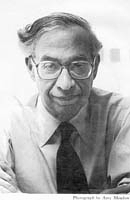
Donald Allen Wollheim was an American science fiction editor, publisher, writer, and fan. As an author, he published under his own name as well as under pseudonyms, including David Grinnell, Martin Pearson, and Darrell G. Raynor.

Fritz Reuter Leiber Jr. was an American writer of fantasy, horror, and science fiction. He was also a poet, actor in theater and films, playwright, and chess expert. With writers such as Robert E. Howard and Michael Moorcock, Leiber is one of the fathers of sword and sorcery and coined the term.
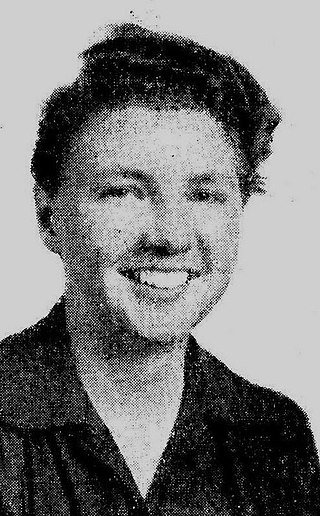
Leigh Douglass Brackett was an American science fiction writer known as "the Queen of Space Opera." She was also a screenwriter, known for The Big Sleep (1946), Rio Bravo (1959), and The Long Goodbye (1973). She also worked on an early draft of The Empire Strikes Back (1980), elements of which remained in the film; she died before it went into production. In 1956, her book The Long Tomorrow made her the first woman ever shortlisted for the Hugo Award for Best Novel, and, along with C. L. Moore, one of the first two women ever nominated for a Hugo Award. In 2020, she won a Retro Hugo for her novel The Nemesis From Terra, originally published as "Shadow Over Mars".

A science-fiction fanzine is an amateur or semi-professional magazine published by members of science-fiction fandom, from the 1930s to the present day. They were one of the earliest forms of fanzine, within one of which the term "fanzine" was coined, and at one time constituted the primary type of science-fictional fannish activity ("fanac").

Tom Reamy was an American science fiction and fantasy author and a key figure in 1960s and 1970s science fiction fandom. He died at age 42 prior to the publication of his first novel; his work is primarily dark fantasy.
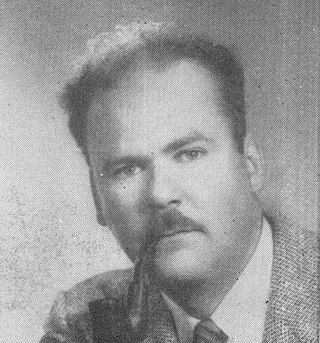
Dallas McCord "Mack" Reynolds was an American science fiction writer. His pen names included Dallas Ross, Mark Mallory, Clark Collins, Dallas Rose, Guy McCord, Maxine Reynolds, Bob Belmont, and Todd Harding. His work focused on socioeconomic speculation, usually expressed in thought-provoking explorations of utopian societies from a radical, sometime satiric perspective. He was a popular author from the 1950s to the 1970s, especially with readers of science fiction and fantasy magazines.
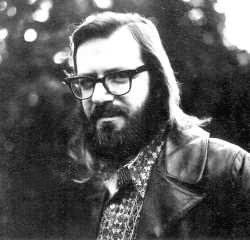
Terry Gene Carr was an American science fiction fan, author, editor, and writing instructor.

The Hugo Award for Best Fanzine is given each year for non professionally edited magazines, or "fanzines", related to science fiction or fantasy which has published four or more issues with at least one issue appearing in the previous calendar year. Awards were also once given out for professional magazines in the professional magazine category, and since 1984 have been awarded for semi-professional magazines in the semiprozine category; several magazines that were nominated for or won the fanzine category have gone on to be nominated for or win the semiprozine category since it was established. The Hugo Awards have been described as "a fine showcase for speculative fiction" and "the best known literary award for science fiction writing".
George H. Scithers was an American science fiction fan, author and editor.
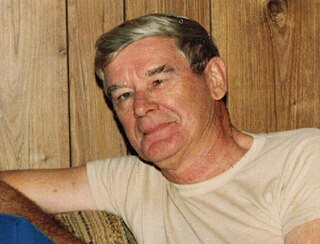
Arthur Wilson "Bob" Tucker was an American author who became well known as a writer of mystery, action adventure, and science fiction under the name Wilson Tucker.
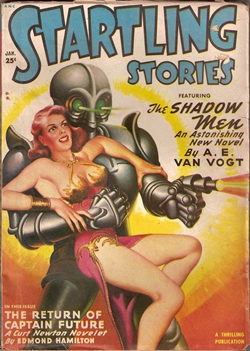
Startling Stories was an American pulp science fiction magazine, published from 1939 to 1955 by publisher Ned Pines' Standard Magazines. It was initially edited by Mort Weisinger, who was also the editor of Thrilling Wonder Stories, Standard's other science fiction title. Startling ran a lead novel in every issue; the first was The Black Flame by Stanley G. Weinbaum. When Standard Magazines acquired Thrilling Wonder in 1936, it also gained the rights to stories published in that magazine's predecessor, Wonder Stories, and selections from this early material were reprinted in Startling as "Hall of Fame" stories. Under Weisinger the magazine focused on younger readers and, when Weisinger was replaced by Oscar J. Friend in 1941, the magazine became even more juvenile in focus, with clichéd cover art and letters answered by a "Sergeant Saturn". Friend was replaced by Sam Merwin Jr. in 1945, and Merwin was able to improve the quality of the fiction substantially, publishing Arthur C. Clarke's Against the Fall of Night, and several other well-received stories.

Wonder Stories was an early American science fiction magazine which was published under several titles from 1929 to 1955. It was founded by Hugo Gernsback in 1929 after he had lost control of his first science fiction magazine, Amazing Stories, when his media company Experimenter Publishing went bankrupt. Within a few months of the bankruptcy, Gernsback launched three new magazines: Air Wonder Stories, Science Wonder Stories, and Science Wonder Quarterly.
Locus: The Magazine of The Science Fiction & Fantasy Field, founded in 1968, is an American magazine published monthly in Oakland, California. It is the news organ and trade journal for the English-language science fiction and fantasy fields. It also publishes comprehensive listings of all new books published in the genres. The magazine also presents the annual Locus Awards. Locus Online was launched in April 1997, as a semi-autonomous web version of Locus Magazine.
Donald Henry Tuck was an Australian bibliographer of science fiction, fantasy and weird fiction. His works were "among the most extensive produced since the pioneering work of Everett F. Bleiler."

David Geddes Hartwell was an American critic, publisher, and editor of thousands of science fiction and fantasy novels. He was best known for work with Signet, Pocket, and Tor Books publishers. He was also noted as an award-winning editor of anthologies. The Encyclopedia of Science Fiction describes him as "perhaps the single most influential book editor of the past forty years in the American [science fiction] publishing world".

Raymond Fisher Jones was an American science fiction author. He is best known for his 1952 novel This Island Earth, which was adapted into the eponymous 1955 film.

The Acolyte was a science fiction fanzine edited by Francis Towner Laney from 1942-1946, dedicated to articles about fantasy fiction, with particular emphasis on H. P. Lovecraft and his circle. Later issues were co-edited and published by Samuel D. Russell.
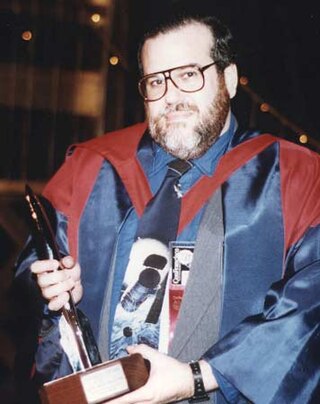
Andrew Ian Porter is an American editor, publisher and active science fiction fan.
The role of women in speculative fiction has changed a great deal since the early to mid-20th century. There are several aspects to women's roles, including their participation as authors of speculative fiction and their role in science fiction fandom. Regarding authorship, in 1948, 10–15% of science fiction writers were female. Women's role in speculative fiction has grown since then, and in 1999, women comprised 36% of the Science Fiction and Fantasy Writers of America's professional members. Frankenstein (1818) by Mary Shelley has been called the first science fiction novel, although women wrote utopian novels even before that, with Margaret Cavendish publishing the first in the seventeenth century. Early published fantasy was written by and for any gender. However, speculative fiction, with science fiction in particular, has traditionally been viewed as a male-oriented genre.
Myrtle Rebecca Smith Gray Nolan, known to science fiction history as Morojo or sometimes Myrtle R Douglas, was a science fiction fan, fanzine publisher, and cosplay pioneer from Los Angeles.
References
- ↑ Tymn, Marshall and Michael Ashley (eds.), Science Fiction, Fantasy, and Weird Fiction Magazines, p. 822.
- ↑ 1946 Retro Hugos List
- ↑ College of Mt. St. Vincent 2008-2009 Undergraduate Catalogue, p. 220.
- ↑ Alumni Notes University of Michigan Dept. of Library Science, p. 1943.